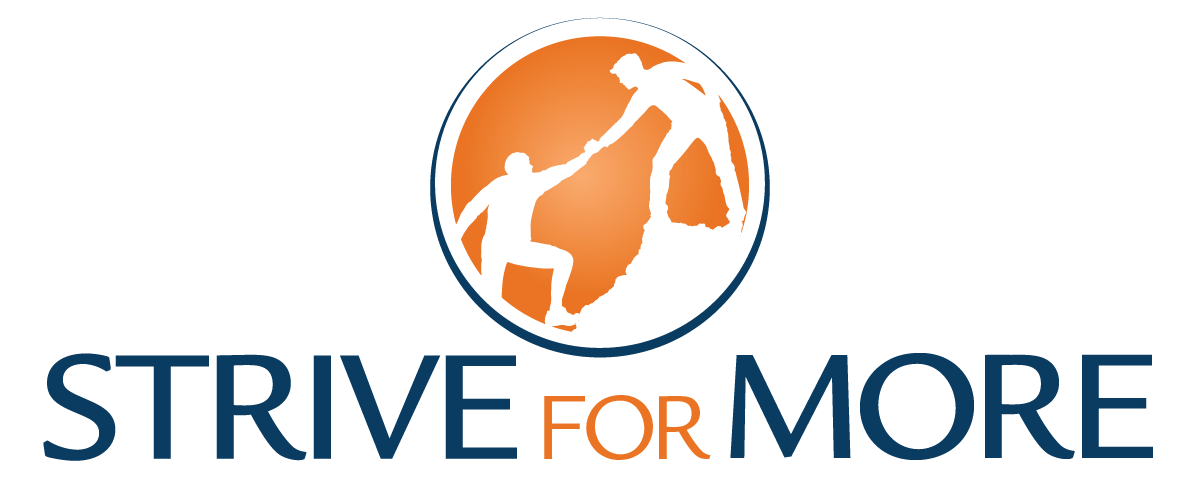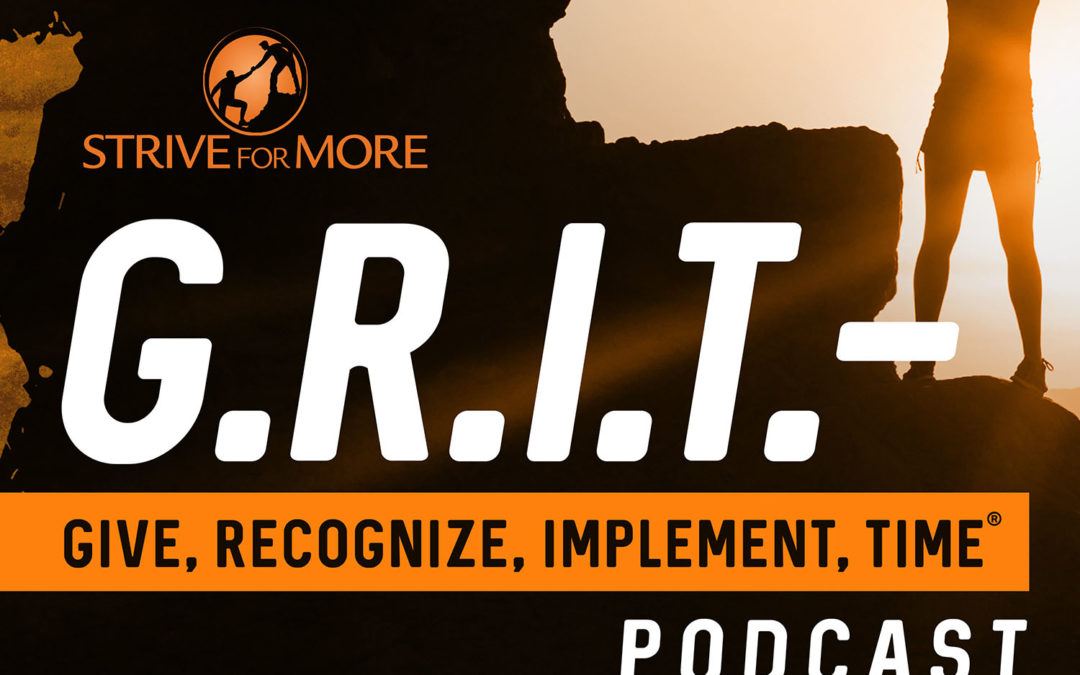Episode Transcript
Hello everybody. I’m Steven Nathenson, CEO and founder of Strive for More, and I want to ask you a question today about adversity. Do you run towards it or do you run away from it? Today we’re going to talk about challenge or adversity. And there’s typically these two possibilities of how we handle it. We either run away from it or we run towards it. We’re going to talk about those here in a second. One of the most common ways that I hear this come about is, “I shy away from conflict,” or, “I don’t shy away from conflict.” I’ve heard both from clients. And that’s a good way of maybe asking this question for you as well, in a slightly different light. Do you like conflict? Do you not? Maybe it’s a challenge for you to handle that, or maybe it’s something that you’re used to handling and it’s fairly easy for you to handle and disarm in those conversations with people. Do you run away or do you run towards it?
When we run away from it, that can typically have some negative or non-serving connotations that can drain us. Or when we dread challenge or adversity, very similar. Knowing that’s coming up and thinking about it and dreading it throughout the day, and that I can’t do it, it’s not possible. I’m not going to enjoy this. It’s going to be awful. Those thoughts are some of the things that can typically come with challenge and adversity and it can drain us when we are in that mindset.
So in line with recognize as part of G.R.I.T. – Give, Recognize, Implement, Time®, we’re talking about choices that we have that are always there for us to make. And when we view challenge, say as an opportunity to grow, there’s a much different mindset that happens when we shy away from challenge. So before we get too deep into that, let’s actually define challenge. So for me, challenge is really, just kind of simply put, something that’s beyond a readily easy thing for me to do. So, for example, I’ve said this before in the show is, two plus two equals four. That’s a fairly easy thing for me to do.
But what if we made that a little bit more challenging? What if we did two to the 16th, two the 16th power? I could still do it. It’s going to take me a little bit more time. So I have to multiply two 16 times, two by two by two by two, so on and so forth, until we get two to the 16th power. It would take me some time to do that, more so than two plus two equals four. So it’s starting to get a little bit more difficult. Now, what if we kept going in that progression and maybe we did two times 58 divided by three plus five times 42 divided by three, and then take the square root of that?
That’s getting a little bit more difficult. That’s something I’d have to sit down and do step-by-step. Okay, I’ve got to do this operation, then this operation. And I may need, with odd numbers, say, a calculator or Microsoft Excel to help me do that. It’s starting to get more difficult, less easy right off the bat for me to do. And let’s take this kind of to the extreme. If someone said, “Hey, Steve, I need you to program a calculator. Let’s actually create a computer program to write a calculator,” that is going to be very challenging for me. That’s going to be very difficult, right? So this is what I’m talking about when we define challenge. What is challenge for us? What does it mean to you? When we know what it is, it’s easier to start seeing how we embrace it, or we shy away from it.
Because yes, while programming a calculator would definitively be difficult for me, it’s actually an opportunity for me to grow, to learn how to do some programming, to leverage some engineering things that I’ve done in the past, but maybe haven’t used for quite some time. And it can help me create that skillset that, should I ever needed in the future, I’m going to have, and maybe opens doors for me in other things that perhaps I need to do, say on a website or something similar with code. Maybe I’ve had this experience that actually taught me how to do it, and it’s easier later to tackle that new challenge.
So that’s what challenge means to me. And that’s my view on it, is I view it as an opportunity to grow. And it’s a fundamental thing, and recognized here with GRIT, because when we view challenge as that opportunity to grow, we have a much more positive mindset, a much more serving mindset. And we start feeling more upbeat, uplifted to go about it versus being stuck in that downward spiral, that negativity, that non-serving thought spiral that just keeps going out of control that we’re talking about at the beginning that can really just drain us throughout the day. So let me ask you, how do you define challenge? What does that word mean to you? And then, how do you go about it? Do you shy away from it? Do you run towards it? Do you see it as an opportunity to grow, to get better, stronger, faster? How does it impact you? Do you feel drained when a challenge is coming up or do you feel excited and motivated?
We have that choice. We can switch that mindset. And let’s go a little bit deeper too, because challenge can actually be a human need. And that may be a good way of also understanding, do you actually shy away from challenge or do you need it? Do you run towards it? So for example, do you need challenge in your day-to-day job? Do you need to use your brain? Do you need to see that I get to think through things? I get to be creative? Maybe I’m designing an ad or new website, or maybe I’ve got a program, a computer program to model the control systems of a nuclear power plant.
Do you need intellectual challenge and stimulation in your job or do you like just simply doing the mundane repetitive tasks? And I don’t mean that to be derogatory towards anyone who really likes that. It’s not that way at all. There are people who really enjoy doing the same thing over and over again, and that’s what’s right for them. And that’s okay. This is just one illustration of how needs of ours as human beings can come out specific to being challenged. If that sounds like you, and you need intellectual stimulation, you need a challenge, you need to be creative, you need to be thinking through things, creating new solutions, new product lines, you may actually be running towards challenge just in a slightly different way that you hadn’t thought about before. And if you are, and if it’s maybe outside of work, it could be in life. It could be in running swimming exercise. It could be in writing a play, acting, taking drama classes.
There may be things that we view as they’re not quite easy to do. They’re a little challenging for me, but I want to work hard towards it. When we know what we do run towards as challenges, and we will look at that and we see what’s helping us take that action and work towards that, we can leverage that very same thing towards larger challenges in our lives. We can recognize that we have that choice when larger challenges come into play or challenges that may keep us a little bit more naturally kind of down and negative. We can leverage what’s made us successful at tackling these smaller challenges to do the same for the larger ones.
So what does challenge mean to you? How do you define it? How do you view it? Do you run towards it? Do you run away from it? Is it different when it’s, say, smaller or larger challenges? These important questions can help us create this awareness for us that let us see that there is that choice to embrace that challenge as an opportunity to grow and recognize we have the choice to do it. And this piece of recognize is critical, so like the other ones, because when we get caught in that negative downward spiral, again, we can create physiological effects and impacts in our bodies that are going to keep us down versus what’s going to keep us up, keep us going, uplift us, keep us positive, serve us and help us get to where we want to go. That choice is always there, and it’s always yours and ours to make for ourselves.
How do you view challenge? What does it mean to you? How can you leverage what challenges you’re already successfully accomplishing to tackle the ones that you’re not? So I’m going to leave you with a little bit different sign off today. I don’t know where the saying originated, so I apologize for that, but it became very popular in the TV show How I Met Your Mother. This saying is, “Challenge accepted.” That saying embraces exactly what we’re talking about. When somebody issues a challenge to you or says something to you, and you say, “Challenge accepted,” you right off the bat are already embracing, “I’m going to take this on. I am going to view this as an opportunity to do something maybe I have not done before, and I’m going to get better for it. Maybe even I’m going to prove you wrong. Just watch me do it.”
Those mentalities through that saying of, “Challenge accepted,” embraces the fact that you have a choice in that moment and you’re choosing the one that’s going to serve you and help you get to where you want to go. So the next time somebody presents something to you, are you going to shy away from it or are you going to accept the challenge?
Listen to all of our episodes here.
Learn More About G.R.I.T. – Give, Recognize, Implement, Time®& Find More Actions You Can Take Right NOW!
To learn more about our signature coaching approach which DOES help people all over the world stay focused, overcome, and achieve, please click here.
Want to Assess Your G.R.I.T. – Give, Recognize, Implement, Time® & get a tangible gauge of key human characteristics that WILL make you successful?
Take our G.R.I.T. – Give, Recognize, Implement, Time assessment now and find out!

